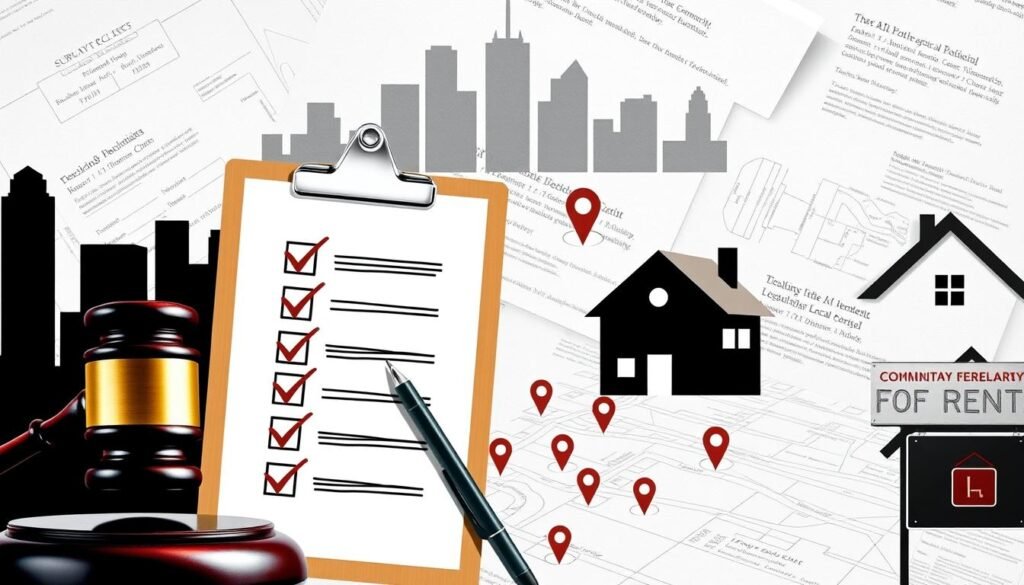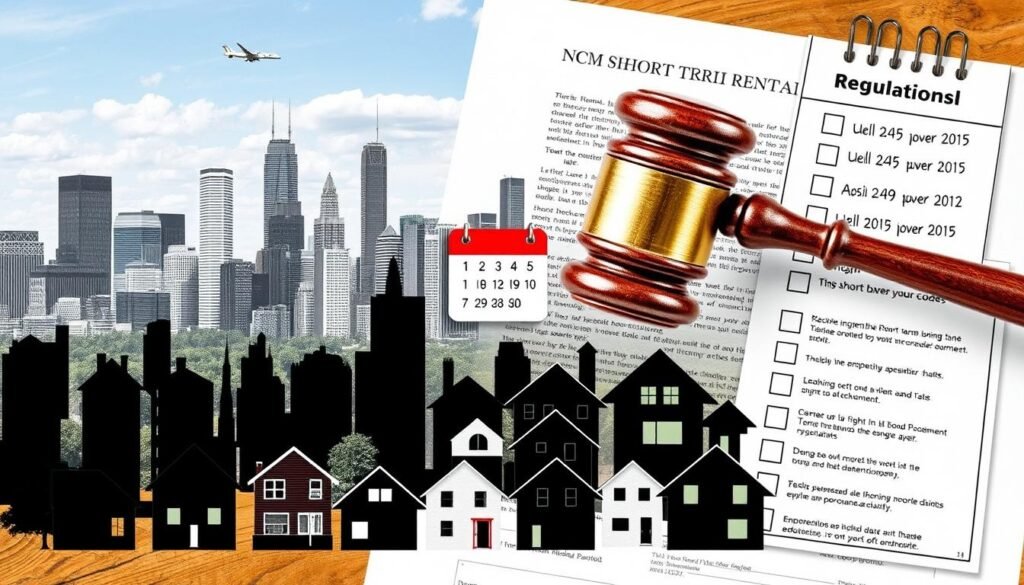Did you know that nearly 1 in 5 short-term rental hosts have faced fines or penalties due to non-compliance with local regulations? This eye-opening statistic underscores the critical importance for hosts to understand and adhere to the myriad of local laws, zoning restrictions, and licensing requirements that govern the short-term rental industry. Ignoring these regulations can not only lead to hefty fines but can also jeopardize your ability to operate your vacation rental business.
As a host, it’s essential to stay up-to-date on the ever-evolving landscape of local regulations. From zoning laws that dictate where you can offer short-term rentals to licensing procedures that ensure your property meets safety standards, navigating this regulatory maze can seem daunting. However, by familiarizing yourself with the rules and regulations in your area, you can ensure your hosting operations remain compliant and sustainable over the long term.
Key Takeaways
- Understanding local regulations is crucial for short-term rental hosts to avoid fines and penalties.
- Zoning laws, licensing requirements, and other local ordinances must be carefully followed to ensure legal and sustainable hosting.
- Staying up-to-date on regulatory changes is essential for hosts to maintain compliance over time.
- Proactive compliance with local laws can help hosts build positive relationships with their communities.
- Proper record-keeping and regular reviews of local regulations are key best practices for hosts.
Understanding Local Regulations for Hosts
When it comes to operating a successful short-term rental property, understanding local regulations is crucial. Local regulations, such as zoning laws, permit acquisition, and compliance guidelines, play a vital role in ensuring a smooth and trouble-free hosting experience.
What Are Local Regulations?
Local regulations refer to the laws, ordinances, and guidelines established by municipal, county, or state governments that govern various aspects of operating a short-term rental property. These regulations can vary significantly from one location to another, making it essential for hosts to familiarize themselves with the specific requirements of their area.
Why Are Local Regulations Important?
Adhering to local regulations is not just a matter of legal compliance; it also helps protect the safety and well-being of both hosts and guests. Permit acquisition and compliance guidelines ensure that properties meet health, safety, and zoning standards, while also safeguarding the interests of the local community. By understanding and following these regulations, hosts can avoid costly fines, legal issues, and damaged reputations, ultimately creating a more positive and sustainable hosting experience.
From navigating zoning laws to obtaining the necessary licenses and permits, understanding local regulations is a crucial aspect of being a responsible and successful short-term rental host. By staying informed and adapting to changes in the regulatory landscape, hosts can ensure their properties remain compliant and their guests have a safe and enjoyable experience.
Types of Local Regulations Affecting Hosts
As a host, navigating the myriad of local regulations can be a daunting task, but understanding the key types of regulations is essential for ensuring compliance and providing a safe, enjoyable experience for your guests. Zoning laws, health and safety codes, and noise ordinances are just a few of the local regulations that can significantly impact your hosting operations.
Zoning Laws and Their Implications
Zoning restrictions play a crucial role in determining the legality of your short-term rental property. Before listing your space, it’s vital to research the zoning regulations in your area to ensure that your property is properly zoned for the intended use. Failure to comply with zoning laws could result in hefty fines or even the forced closure of your rental.
Health and Safety Codes
Ensuring the safety and well-being of your guests should be a top priority for any host. Local health and safety codes outline a range of requirements, from fire safety standards to proper sanitation and maintenance. Familiarizing yourself with these codes and implementing the necessary measures can help you avoid potential legal issues and provide a secure environment for your guests.
Noise Ordinances
Noise ordinances are another important consideration for hosts, as they often regulate the acceptable levels of noise and the permissible hours for various activities. Violating these ordinances can lead to complaints from neighbors and potential fines. As a responsible host, it’s essential to inform your guests about local noise restrictions and encourage them to be mindful of their noise levels, especially during late-night hours.
By understanding and complying with these types of local regulations, hosts can ensure a smooth and successful hosting experience while maintaining positive relationships with their communities.

| Regulation | Description | Potential Consequences |
|---|---|---|
| Zoning Laws | Rules that govern the permitted uses of a property within a specific zone or district. | Fines, forced closure of rental, or legal action for non-compliance. |
| Health and Safety Codes | Standards that ensure the safety and well-being of guests, including fire safety, sanitation, and maintenance requirements. | Fines, legal issues, or revocation of operating licenses for non-compliance. |
| Noise Ordinances | Regulations that limit the acceptable levels of noise and the permissible hours for various activities. | Fines, neighbor complaints, or legal action for violating noise restrictions. |
Licensing Requirements for Short-Term Rentals
As an Airbnb host, it’s crucial to understand the licensing requirements for operating a short-term rental in your local area. Depending on your location, you may need to obtain various permits and licenses to comply with short-term rental laws. Navigating this process can seem daunting, but with the right information, you can ensure your hosting business is operating legally and avoiding potential fines or penalties.
Types of Licenses Needed
The specific licenses required for your short-term rental may vary based on your city or county’s regulations. Common types of licenses and permits include:
- Business License: Many areas require hosts to obtain a general business license to operate a short-term rental.
- Vacation Rental Permit: Some jurisdictions have specific permits for vacation rentals or short-term lodging.
- Zoning Permit: Depending on your property’s zoning, you may need a permit to use it for short-term rental purposes.
- Tax Registration: You’ll likely need to register your short-term rental for applicable sales, occupancy, or other local taxes.
Application Process for Licenses
The application process for licensing requirements and permit acquisition can vary widely depending on your location. It’s essential to research the specific steps and documentation needed in your area. Generally, the process may involve:
- Gathering all required paperwork, such as proof of ownership, insurance, and safety inspections.
- Submitting the necessary application forms, either online or in person, to the appropriate local government office.
- Paying any associated fees, which can range from a few hundred to several thousand dollars, depending on your location.
- Potentially attending a hearing or inspection before your license or permit is approved.
Staying up-to-date and compliant with short-term rental laws is crucial for Airbnb hosts. By understanding the licensing requirements and navigating the permit acquisition process, you can ensure your short-term rental business operates smoothly and legally within your community.

Property Tax Considerations for Hosts
As a short-term rental host, understanding the impact of local property taxes is crucial for ensuring compliance with tax obligations and maintaining profitability. Navigating the intricacies of short-term rental laws and compliance guidelines can be a complex task, but with the right knowledge, you can stay ahead of the curve.
How Local Taxes Affect Your Hosting
Depending on your location, the property taxes you owe can vary significantly. In some areas, short-term rental properties may be subject to higher tax rates or additional fees compared to long-term rentals. It’s essential to research the specific tax obligations in your jurisdiction and factor them into your hosting business plan.
| Tax Consideration | Potential Impact |
|---|---|
| Property Tax Rate | Higher rates for short-term rentals can reduce your profit margins. |
| Licensing and Permit Fees | Additional fees required to operate a short-term rental can add to your overall costs. |
| Occupancy Taxes | Taxes charged per guest night can impact the pricing of your listings. |
Tax Reporting Best Practices
Staying on top of your tax obligations is crucial for maintaining compliance with short-term rental laws. This includes accurately tracking and reporting all income, expenses, and taxes owed. Consider implementing the following best practices:
- Establish a robust record-keeping system to document all financial transactions.
- Familiarize yourself with the compliance guidelines in your area, including any special tax forms or reporting requirements.
- Consult with a tax professional to ensure you’re meeting all local and federal tax obligations.
- Stay informed about any changes in short-term rental laws or tax regulations that may impact your hosting activities.
By proactively addressing property tax considerations and adopting sound tax reporting practices, you can operate your short-term rental business with confidence and minimize the risk of non-compliance.

Insurance Requirements for Hosts
As a responsible short-term rental host, ensuring the safety and compliance of your property is of utmost importance. One critical aspect of this is understanding the insurance requirements that apply to your hosting activities. Navigating the intricacies of insurance can be complex, but it’s a necessary step to protect both you and your guests.
Types of Insurance to Consider
When it comes to hosting short-term rentals, there are several types of insurance coverage you should consider. These may include:
- Liability Insurance: This protects you from financial liability in case a guest is injured or their property is damaged during their stay.
- Property Insurance: This covers damages to your rental property, such as natural disasters, fires, or vandalism.
- Rental Income Insurance: This provides coverage for lost rental income if your property becomes uninhabitable due to a covered event.
- Umbrella Insurance: This offers additional liability coverage beyond your standard policies, providing an extra layer of protection.
Liability Insurance versus Homeowners Insurance
It’s important to note that your standard homeowners or renters insurance may not provide adequate coverage for short-term rental activities. Liability insurance is specifically designed to address the unique risks associated with hosting guests, such as injuries, property damage, or even legal issues. In contrast, homeowners insurance typically has more limited coverage for rental-related activities.
To ensure you meet the safety requirements and compliance guidelines set by local short-term rental laws, it’s crucial to consult with an insurance professional who specializes in vacation rental insurance or landlord insurance. They can help you identify the appropriate coverage for your specific hosting needs and ensure you have the necessary protection in place.

Safety and Security Regulations
As a responsible short-term rental host, ensuring the safety and security of your guests is of utmost importance. Local authorities have established specific fire safety standards and emergency preparedness requirements that you must adhere to in order to maintain compliance guidelines and provide a safe environment for your guests.
Fire Safety Standards
One of the key safety requirements for short-term rental properties is adherence to local fire safety standards. This may include the installation of smoke detectors, fire extinguishers, and emergency lighting. In some cases, you may also need to obtain a fire safety inspection and certificate to operate your rental legally.
Emergency Preparedness Requirements
Beyond fire safety, hosts must also be prepared for other potential emergencies. This may involve creating an emergency action plan, having a well-stocked first-aid kit, and ensuring clear communication channels with local authorities and emergency services. Additionally, zoning restrictions may dictate the placement and visibility of emergency exit signs and routes.
| Fire Safety Requirements | Emergency Preparedness Requirements |
|---|---|
|
|

By understanding and adhering to these safety and security regulations, you can ensure the well-being of your guests while also maintaining legal compliance. Taking a proactive approach to fire safety and emergency preparedness is not only the responsible thing to do but also a critical aspect of running a successful short-term rental business.
Accessibility Regulations for Rental Properties
As a responsible host, it’s crucial to ensure your rental property is accessible and compliant with relevant regulations. Accessibility is not just a legal requirement but a crucial aspect of providing an inclusive and welcoming experience for all guests.
Understanding ADA Compliance
The Americans with Disabilities Act (ADA) sets forth comprehensive guidelines for accessibility in public accommodations, including short-term rental properties. Adhering to ADA compliance guidelines means ensuring your property meets the necessary safety requirements and zoning restrictions to accommodate guests with disabilities.
Making Your Property Accessible
To make your rental property accessible, consider the following key aspects:
- Accessible entrances and pathways: Ensure there are no physical barriers that could impede entry or movement for guests with mobility challenges.
- Wheelchair-friendly features: Provide ample maneuvering space, lowered countertops, and grab bars in bathrooms.
- Sensory-friendly elements: Incorporate visual and auditory cues to assist guests with sensory processing needs.
- Adaptable furniture and equipment: Offer furniture and appliances that can be easily adjusted to accommodate different needs.
By prioritizing accessibility and compliance guidelines, you can create a welcoming and inclusive environment for all your guests, while also ensuring your property meets the necessary safety requirements and zoning restrictions.

“Inclusive hosting is not just the right thing to do, it’s also good business. When you cater to the needs of all your guests, you open your doors to a wider audience and create a more positive, memorable experience for everyone.”
Neighbor Relations and Community Guidelines
As an Airbnb host, maintaining positive relationships with your neighbors is crucial. Understanding and adhering to local neighborhood guidelines and noise ordinances can help ensure a seamless hosting experience for you and your guests, while also fostering goodwill within the community. Proactive communication and professional compliance guidelines are key to navigating this delicate balance.
Communicating with Neighbors
Establishing open communication with your neighbors from the outset can go a long way in building trust and mitigating potential issues. Consider introducing yourself, sharing your hosting plans, and providing clear contact information should any concerns arise. Encourage neighbors to reach out directly with any questions or complaints, demonstrating your willingness to address their needs promptly and professionally.
Handling Complaints Professionally
Despite your best efforts, there may be occasions when you receive complaints from neighbors regarding noise, parking, or other disturbances. When this happens, it’s essential to respond swiftly and with empathy. Acknowledge their concerns, apologize if appropriate, and work collaboratively to find a mutually agreeable. By maintaining a constructive dialogue, you can often resolve issues before they escalate, preserving positive relationships within the community.
| Neighbor Complaint | Suggested Response |
|---|---|
| Excessive Noise | Apologize for the disturbance, remind guests of noise ordinances, and offer to address the issue directly with them. |
| Parking Concerns | Clarify parking guidelines, provide alternative options, and ensure guests adhere to local regulations. |
| General Nuisance | Discuss the specific concern, reiterate your commitment to being a responsible host, and work collaboratively to find a resolution. |
By prioritizing open communication and professional complaint handling, you can navigate the delicate balance of being a considerate host while maintaining positive relationships with your neighbors and the surrounding community.

Environmental Regulations Affecting Hosting
As a responsible host, it’s crucial to understand the impact of local environmental laws on your short-term rental business. These regulations not only ensure compliance but also promote sustainable practices that benefit the community and the environment. Navigating the complex web of compliance guidelines, zoning restrictions, and neighborhood guidelines can be a challenge, but it’s a necessary step to ensure the long-term success of your hosting venture.
Impact of Local Environmental Laws
Local governments often have specific regulations in place to address environmental concerns, such as waste management, water conservation, and energy efficiency. Hosts must familiarize themselves with these laws to avoid potential fines or penalties. For instance, some areas may have strict zoning restrictions on the types of properties that can be used for short-term rentals, while others may require hosts to follow neighborhood guidelines regarding noise levels, parking, and waste disposal.
Sustainable Hosting Practices
Embracing sustainable hosting practices not only helps you comply with local environmental regulations, but it also demonstrates your commitment to the community and the planet. Some eco-friendly initiatives you can consider include:
- Implementing energy-efficient lighting and appliances
- Encouraging guests to conserve water and minimize waste
- Providing recycling and composting facilities
- Promoting the use of public transportation or electric vehicles
- Incorporating renewable energy sources, such as solar panels, into your property
By embracing sustainable hosting practices, you not only contribute to a healthier environment but also enhance your property’s appeal to eco-conscious travelers.
| Environmental Regulation | Impact on Hosting | Sustainable Hosting Practice |
|---|---|---|
| Waste Management | Require proper disposal and recycling of waste | Provide clear recycling and composting instructions for guests |
| Water Conservation | Enforce water usage limits and restrictions | Install low-flow faucets and showerheads, and educate guests on water-saving tips |
| Energy Efficiency | Mandate the use of energy-efficient appliances and lighting | Utilize renewable energy sources, such as solar panels, and encourage guests to conserve energy |
By staying informed about local environmental regulations and implementing sustainable hosting practices, you can not only ensure compliance but also contribute to the well-being of the community and the environment.

Changes in Local Regulations
As the short-term rental industry continues to evolve, it’s crucial for hosts to stay updated on the latest regulatory changes in their local area. Navigating the ever-shifting landscape of short-term rental laws, compliance guidelines, and zoning restrictions can be a daunting task, but it’s essential for maintaining a successful hosting business.
Staying Updated on Regulatory Changes
Keeping a close eye on local government websites, attending community meetings, and joining online forums can help hosts stay informed about the latest regulatory updates. Proactively checking for changes in licensing requirements, tax obligations, and safety standards can ensure that hosts remain compliant and avoid costly penalties.
How to Adapt Your Hosting Strategy
- Review your current hosting practices and identify areas that may need to be adjusted based on new regulations.
- Communicate with local authorities to understand the rationale behind policy changes and explore opportunities for collaboration.
- Implement flexible hosting strategies that allow you to quickly adapt to regulatory shifts, such as offering more long-term rentals or diversifying your portfolio.
- Stay informed about industry trends and best practices to anticipate future regulatory changes and position your business for success.
By maintaining a proactive and adaptable approach to short-term rental hosting, hosts can navigate the evolving regulatory landscape and continue to thrive in their local markets.

“Flexibility and responsiveness are key to succeeding as a short-term rental host in today’s dynamic regulatory environment.”
| Regulatory Change | Potential Impact | Adaptation Strategies |
|---|---|---|
| Increased zoning restrictions | Limits on the number of rental properties or designated areas for short-term rentals | Diversify rental portfolio, explore long-term rental options, engage with local authorities |
| New licensing requirements | Additional paperwork, fees, and compliance measures for hosts | Stay informed on new regulations, ensure proper licensing, automate administrative tasks |
| Stricter safety standards | Increased investment in property upgrades and safety features | Proactively implement safety measures, maintain detailed records, collaborate with local fire departments |
Best Practices for Compliance
As an Airbnb host, maintaining compliance with local regulations is crucial for the success and longevity of your short-term rental business. Two key best practices to ensure compliance are keeping proper records and regularly reviewing local laws.
Keeping Proper Records
Meticulous record-keeping is essential for any Airbnb host. Maintain detailed documentation of all aspects of your hosting, including guest information, reservations, payments, and any issues or incidents that may have occurred. This comprehensive record-keeping will not only help you stay organized but also demonstrate your compliance with licensing requirements and short-term rental laws if ever needed.
Regularly Reviewing Local Laws
The compliance guidelines for Airbnb hosts can evolve over time, so it’s crucial to stay up-to-date on any changes in your local short-term rental laws and licensing requirements. Regularly review the relevant regulations in your area and adjust your hosting practices accordingly to ensure you remain compliant.
| Best Practice | Benefit |
|---|---|
| Keeping Proper Records | Demonstrates compliance, helps with organization and problem-solving |
| Regularly Reviewing Local Laws | Ensures you stay up-to-date with evolving regulations, helps you adapt your hosting practices |
By diligently following these best practices, Airbnb hosts can minimize the risk of non-compliance and maintain a successful, sustainable short-term rental operation that adheres to all relevant laws and regulations.
“Compliance is not just about avoiding penalties, it’s about building trust and credibility with your guests and the local community.”

Supporting Local Initiatives
As an Airbnb host, it’s crucial to be a responsible member of the community and align your hosting practices with local guidelines. This includes collaborating with local authorities and encouraging community engagement to build strong neighborhood relations.
Collaborating with Local Authorities
Establishing a positive rapport with local authorities is key to ensuring your short-term rental operations adhere to neighborhood guidelines and compliance guidelines. Reach out to your city’s zoning department, licensing office, and community development teams to understand the zoning restrictions and regulations that apply to your property. By proactively engaging with these local entities, you can stay informed about any changes or updates to the rules and regulations governing your rental business.
Encouraging Community Engagement
- Attend neighborhood association meetings to connect with local residents and address any concerns they may have about your short-term rental operations.
- Participate in community events and initiatives to demonstrate your commitment to being a good neighbor and contributing to the local area.
- Encourage your guests to be mindful of the neighborhood and follow any applicable guidelines, such as noise ordinances or parking restrictions.
By fostering strong relationships with local authorities and the community, you can position yourself as a responsible and valued member of the neighborhood. This not only helps you maintain compliance but also contributes to the overall vibrancy and cohesion of the local area.

Engaging with your local community and authorities can be a rewarding experience, ultimately leading to a more sustainable and successful Airbnb hosting business. By proactively addressing neighborhood guidelines, compliance guidelines, and zoning, you can establish yourself as a trusted and reliable host within the community.
Resources for Hosts
As a short-term rental host, staying informed about the latest short-term rental laws, compliance guidelines, and licensing requirements is crucial. Fortunately, there are various resources available to help you navigate the complex landscape of local regulations.
Where to Find Regulatory Information
The first step in ensuring compliance is to familiarize yourself with the relevant laws and regulations in your area. Start by visiting your city or county’s official website, which often provides detailed information on the short-term rental laws and licensing requirements specific to your location. Many municipalities also offer guidebooks or informational brochures to help hosts understand their obligations.
If you’re unsure about a particular regulation or need further clarification, consider reaching out to your local government’s planning or zoning department. These offices can provide valuable insights and guidance to help you comply with the compliance guidelines in your area.
Useful Local Hosting Organizations
- Join local short-term rental associations or industry groups. These organizations can be invaluable sources of information, networking opportunities, and advocacy support.
- Attend local events and workshops hosted by these groups. They often offer educational sessions on short-term rental laws, compliance guidelines, and licensing requirements.
- Participate in online forums or discussion groups focused on short-term rentals in your area. These platforms can be great places to connect with other hosts and stay up-to-date on regulatory changes.
By utilizing these resources, you can ensure that your hosting practices align with the latest short-term rental laws, compliance guidelines, and licensing requirements in your local area, ultimately helping you maintain a successful and compliant short-term rental business.

Hosting with Responsiveness to Regulations
As a responsible Airbnb host, it’s crucial to stay up-to-date with the ever-evolving compliance guidelines, short-term rental laws, and zoning restrictions in your local area. Adopting a proactive approach to hosting can ensure that your practices align seamlessly with the regulatory landscape, safeguarding your business and providing guests with a secure and enjoyable experience.
Strategies for Proactive Hosting
Proactive hosts take the initiative to thoroughly understand the legal requirements and guidelines governing short-term rentals in their communities. This involves regularly reviewing local zoning restrictions and compliance guidelines, staying informed about any short-term rental law updates, and adapting their hosting policies accordingly.
- Familiarize yourself with all relevant local regulations and ensure your property and hosting practices comply with them.
- Establish clear and transparent communication with your guests about the rules and expectations, to foster a shared understanding of responsible hosting.
- Implement comprehensive safety and security measures that align with local guidelines, prioritizing the well-being of your guests and neighbors.
Incorporating Regulations into Hosting Policies
Proactive hosts seamlessly integrate regulatory requirements into their hosting policies, creating a structured and compliant framework for their operations. By aligning their practices with local short-term rental laws and zoning restrictions, hosts can demonstrate their commitment to responsible hosting and maintain positive relationships with their communities.
- Develop comprehensive hosting policies that address all relevant compliance guidelines, including licensing, taxes, insurance, and safety standards.
- Regularly review and update your hosting policies to ensure they remain current with any changes in local regulations.
- Communicate your hosting policies clearly to guests, ensuring they understand and agree to abide by the rules during their stay.
By adopting a proactive and responsive approach to hosting, you can navigate the regulatory landscape with confidence, foster trust within your community, and provide your guests with a seamless and memorable experience.

“Hosting with responsiveness to regulations is not just a legal requirement, but a cornerstone of building a sustainable and thriving short-term rental business.”
Conclusion: The Importance of Compliance
As we reach the end of our exploration of local regulations for short-term rental hosts, it’s clear that compliance with these guidelines is paramount. Adhering to zoning laws, health and safety codes, and other community-specific requirements not only ensures the safety and satisfaction of your guests but also preserves the integrity of the neighborhoods in which you operate.
Final Thoughts
Responsible hosting is a commitment that extends far beyond simply offering a comfortable space for travelers. It means being a good steward of the communities you serve, respecting local ordinances, and fostering positive relationships with your neighbors. By staying up-to-date on the latest regulatory changes and proactively addressing any concerns, you can navigate the complexities of the short-term rental landscape with confidence and maintain the trust of both your guests and your local authorities.
Moving Forward as a Responsible Host
As you continue your journey as a short-term rental host, remember that compliance with compliance guidelines, short-term rental laws, and neighborhood guidelines is not just a legal obligation but a moral imperative. By prioritizing the well-being of your community and demonstrating a genuine commitment to responsible hosting, you can not only protect your business but also contribute to the overall vibrancy and sustainability of the short-term rental industry.
FAQ
What are local regulations, and why are they important for short-term rental hosts?
Local regulations refer to the laws, ordinances, and guidelines set by municipal or county governments that govern the operation of short-term rental properties. These regulations are crucial for hosts to understand and comply with, as they determine the legality and requirements for operating a short-term rental within a specific jurisdiction.
What types of local regulations affect short-term rental hosts?
Short-term rental hosts may face a variety of local regulations, including zoning laws that dictate where and how properties can be used for short-term rentals, health and safety codes, noise ordinances, licensing requirements, and tax obligations.
What licenses or permits do I need to operate a short-term rental?
The specific licensing requirements for short-term rentals vary by location. Hosts may need to obtain business licenses, vacation rental permits, or other forms of authorization from local authorities before operating a short-term rental. The application process can also vary, so it’s important to research the requirements in your area.
How do local taxes affect short-term rental hosts?
Short-term rental hosts are typically subject to various local taxes, such as occupancy taxes, sales taxes, and lodging taxes. Hosts must understand their tax obligations and comply with reporting and payment requirements to avoid penalties or legal issues.
What types of insurance do short-term rental hosts need?
Short-term rental hosts should consider both liability insurance and homeowners or renters insurance to protect their property and guests. Liability insurance covers claims made by guests, while homeowners or renters insurance protects the physical property and personal belongings.
What safety and security regulations do short-term rental hosts need to be aware of?
Short-term rental hosts must comply with local fire safety standards, emergency preparedness requirements, and other safety regulations to ensure the well-being of their guests. This may include installing smoke detectors, carbon monoxide detectors, and providing emergency information and supplies.
How can short-term rental hosts maintain good relationships with their neighbors?
Effective communication with neighbors, addressing any concerns or complaints promptly, and adhering to local noise ordinances and community guidelines can help short-term rental hosts foster positive relationships within the community.
How can short-term rental hosts stay informed about changes in local regulations?
Hosts should regularly review local laws and regulations, stay updated on any changes or updates, and adapt their hosting strategies accordingly to ensure ongoing compliance.
What are some best practices for short-term rental hosts to maintain compliance?
Best practices include keeping detailed records, regularly reviewing local laws, and incorporating compliance requirements into hosting policies and procedures. Hosts should also consider collaborating with local authorities and supporting community initiatives to demonstrate their commitment to responsible hosting.



